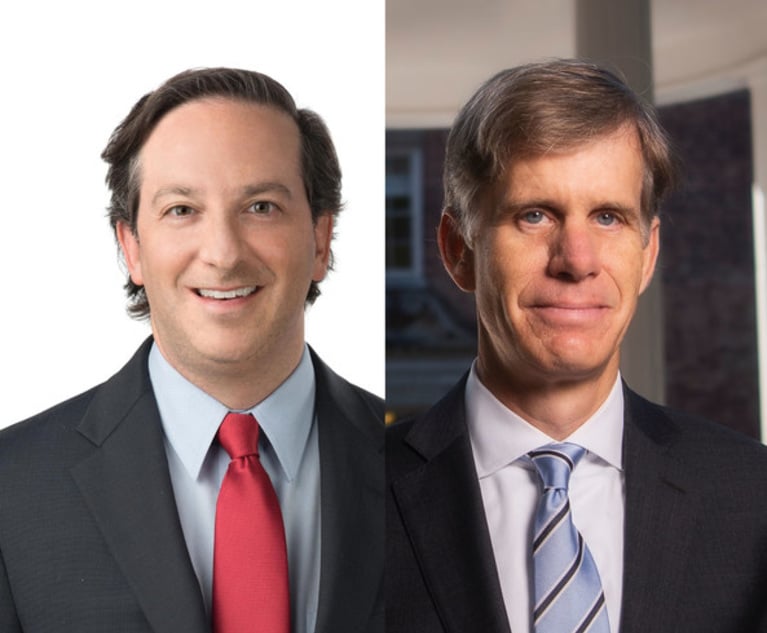Atlanta Legal Professionals Say 'Caste' System Exists at Law Firms
Too often, they said, lawyers do not treat staff like professionals.
August 30, 2019 at 03:10 PM
5 minute read
 (Photo: Master1305/Shutterstock.com)
(Photo: Master1305/Shutterstock.com)
The legal community has been buzzing about a recent article in The American Lawyer, a Daily Report affiliate, describing a "caste" system between lawyers and other professionals at law firms .
"Many professional law firm staff tell stories of a two-tiered system that minimizes their role and contributions," the article reported.
In the Atlanta legal community, a paralegal trainer, a senior marketing staffer in a law firm and a former Big Law attorney who is now a therapist said the issue is real and important. It boils down to people who aren't lawyers feeling like they are not treated like professionals, they said.
"I don't think firms even know how bad it is," said Ann Pearson, who runs the Paralegal Boot Camp.
A managing partner of an Atlanta firm, who asked not to be named, said there was a lot of potential for a problem, given the clear distinction between people who are licensed to practice law and people who aren't. "It has to come from the top down," he said, that the work of the firm "is a team effort."
A second managing partner, who heads an Am Law 100 firm with an office in Atlanta, said he was "astounded" by the article.
"I don't believe we have a caste system," he said.
"Not much gets done without a capable and professional staff," he added, calling lawyers who treat the staff as anything less than professional are "very short-sighted."
Pearson has been in the legal industry for 25 years, including working as a paralegal manager at McKenna Long & Aldridge before it merged into Dentons. Her company serves as a bridge for paralegals between the basic knowledge needed for certification and the skills needed to be productive at a law firm.
Pearson said the "caste" situation can be caused by this mindset at law firms: If staff are "paid a decent wage, they'll put up with the passive-aggressive or aggressive," behavior of attorneys. As an example of the former, she recalled an attorney scolding a paralegal in an email that was copied to dozens of other lawyers. As an example of the latter, she said she's seen a lawyer throw a thick brief at a secretary.
"People know which firms will pay you hazard pay" to work for such lawyers, Pearson said.
The problem persists, she said, because staffers who leave the firm to escape this treatment rarely tell the firm the truth.
The first managing partner was familiar with the concept of "hazard pay," but he said the lawyers who cause this trouble do not exemplify a "caste" system.
"I know the people who are difficult," he said. "They talk down to their staff … and everyone else."
He said from a management perspective, often the best way to curb bad behavior is to threaten to call the lawyer out. "They don't want to be embarrassed," he said.
While Pearson suggested that younger generations may not tolerate mistreatment or differential treatment, the first managing partner said sometimes the problems come from younger lawyers who think, "They've earned to be placed in a different category."
"They don't tell you how to be a boss in law school," he said, so it's up to more senior partners and practice group leaders to help the younger lawyers learn management skills.
The senior marketing person who spoke to the Daily Report said the "caste" system varies by firm, by lawyer and by employee.
As real as the "caste" system is, with some lawyers not treating staff as professionals, this person added that employees have responsibilities too. Just like lawyers must learn their clients' businesses to be successful, law firm employees need to do the same. "The onus is on staff folks to plug yourself in," the marketing person said. Participating in legal community events can help accomplish this goal, the person said.
In a different context, when faced with obstinate lawyers in a debate over how to tackle a problem that doesn't involve practicing law, the marketing professional suggested it's OK to say sometimes, "I've been doing this a long time, and you need to trust me." (And other times, it's prudent to agree to disagree, the marketing professional added.)
Finally, the marketing person suggested that lawyers at firms need to let their staff do their work that doesn't involve legal advice—but many firms "are not built to develop that talent."
Stacey Dougan, the lawyer-turned-therapist, agreed, saying "I don't know how sustainable this model is."
She was a partner and assistant general counsel at Greenberg Traurig in Miami before moving to Atlanta, where she served as chief professional development officer at Powell Goldstein (which merged into Bryan Cave).
At Powell Goldstein, she said, "I almost wanted to wear a name tag that said, 'I used to be a partner at a law firm.'"
She said she understood that lawyers are different from their staffs, and that difference is important, because only lawyers can practice law.
That distinction, she said, doesn't account for "such a powerful hierarchy" in law firms, which is combined with lawyers' tendencies to be perfectionists and pessimists. While lawyers may be very smart, some need to learn managing skills, she said.
Dougan was skeptical of the marketing professional's suggestion that nonlawyer staff should try to be more involved in a firm's business and, for example, participate in after-hours legal events. "They're not making the money of the lawyers," she said, and they are often juggling other family obligations.
Plus, she added, "They're not invited to the table."
Further reading
Confronting the Caste System, Some California Staffers Say Specialization Helps
This content has been archived. It is available through our partners, LexisNexis® and Bloomberg Law.
To view this content, please continue to their sites.
Not a Lexis Subscriber?
Subscribe Now
Not a Bloomberg Law Subscriber?
Subscribe Now
NOT FOR REPRINT
© 2025 ALM Global, LLC, All Rights Reserved. Request academic re-use from www.copyright.com. All other uses, submit a request to [email protected]. For more information visit Asset & Logo Licensing.
You Might Like
View All

On The Move: Ex-Partner Returns to Lead Nelson Mullins Corporate Group, Burr & Forman Hires University GC as COO
5 minute read
Law Firm Sued for Telemarketing Calls to Customers on Do Not Call Registry

Trending Stories
- 1New York-Based Skadden Team Joins White & Case Group in Mexico City for Citigroup Demerger
- 2No Two Wildfires Alike: Lawyers Take Different Legal Strategies in California
- 3Poop-Themed Dog Toy OK as Parody, but Still Tarnished Jack Daniel’s Brand, Court Says
- 4Meet the New President of NY's Association of Trial Court Jurists
- 5Lawyers' Phones Are Ringing: What Should Employers Do If ICE Raids Their Business?
Who Got The Work
J. Brugh Lower of Gibbons has entered an appearance for industrial equipment supplier Devco Corporation in a pending trademark infringement lawsuit. The suit, accusing the defendant of selling knock-off Graco products, was filed Dec. 18 in New Jersey District Court by Rivkin Radler on behalf of Graco Inc. and Graco Minnesota. The case, assigned to U.S. District Judge Zahid N. Quraishi, is 3:24-cv-11294, Graco Inc. et al v. Devco Corporation.
Who Got The Work
Rebecca Maller-Stein and Kent A. Yalowitz of Arnold & Porter Kaye Scholer have entered their appearances for Hanaco Venture Capital and its executives, Lior Prosor and David Frankel, in a pending securities lawsuit. The action, filed on Dec. 24 in New York Southern District Court by Zell, Aron & Co. on behalf of Goldeneye Advisors, accuses the defendants of negligently and fraudulently managing the plaintiff's $1 million investment. The case, assigned to U.S. District Judge Vernon S. Broderick, is 1:24-cv-09918, Goldeneye Advisors, LLC v. Hanaco Venture Capital, Ltd. et al.
Who Got The Work
Attorneys from A&O Shearman has stepped in as defense counsel for Toronto-Dominion Bank and other defendants in a pending securities class action. The suit, filed Dec. 11 in New York Southern District Court by Bleichmar Fonti & Auld, accuses the defendants of concealing the bank's 'pervasive' deficiencies in regards to its compliance with the Bank Secrecy Act and the quality of its anti-money laundering controls. The case, assigned to U.S. District Judge Arun Subramanian, is 1:24-cv-09445, Gonzalez v. The Toronto-Dominion Bank et al.
Who Got The Work
Crown Castle International, a Pennsylvania company providing shared communications infrastructure, has turned to Luke D. Wolf of Gordon Rees Scully Mansukhani to fend off a pending breach-of-contract lawsuit. The court action, filed Nov. 25 in Michigan Eastern District Court by Hooper Hathaway PC on behalf of The Town Residences LLC, accuses Crown Castle of failing to transfer approximately $30,000 in utility payments from T-Mobile in breach of a roof-top lease and assignment agreement. The case, assigned to U.S. District Judge Susan K. Declercq, is 2:24-cv-13131, The Town Residences LLC v. T-Mobile US, Inc. et al.
Who Got The Work
Wilfred P. Coronato and Daniel M. Schwartz of McCarter & English have stepped in as defense counsel to Electrolux Home Products Inc. in a pending product liability lawsuit. The court action, filed Nov. 26 in New York Eastern District Court by Poulos Lopiccolo PC and Nagel Rice LLP on behalf of David Stern, alleges that the defendant's refrigerators’ drawers and shelving repeatedly break and fall apart within months after purchase. The case, assigned to U.S. District Judge Joan M. Azrack, is 2:24-cv-08204, Stern v. Electrolux Home Products, Inc.
Featured Firms
Law Offices of Gary Martin Hays & Associates, P.C.
(470) 294-1674
Law Offices of Mark E. Salomone
(857) 444-6468
Smith & Hassler
(713) 739-1250






